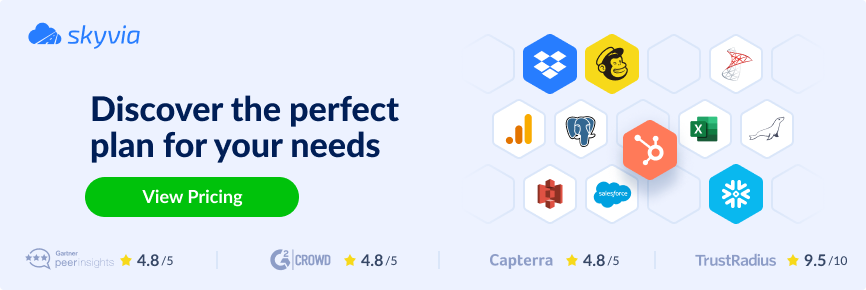TIBCO is a multi-faceted tool that is used for process automation, data integration, file management, and other corporate operations. It’s definitely popular among enterprises due to its comprehensive feature set and advanced security features. Meanwhile, TIBCO solutions aren’t so widely used by small and mid-size companies.
As a result, we’d like to present some of the best TIBCO alternatives that would suit any business size. We’ll also provide the benefits and limitations of each solution to help you decide upon the most suitable option.
Table of Contents
- Introduction to Tibco
- Why Might You Need to Migrate from TIBCO?
- Top TIBCO Alternatives & Competitors
- Skyvia
- SAS Data Management
- Informatica
- Talend
- Boomi
- IBM InfoSphere
- Mulesoft
- Summary
Introduction to Tibco
TIBCO is a software company that develops multiple solutions for data integration. Its pioneer product is called TIBCO Platform, a GUI-based enterprise-level tool that helps businesses obtain a unified overview of their data-related operations.
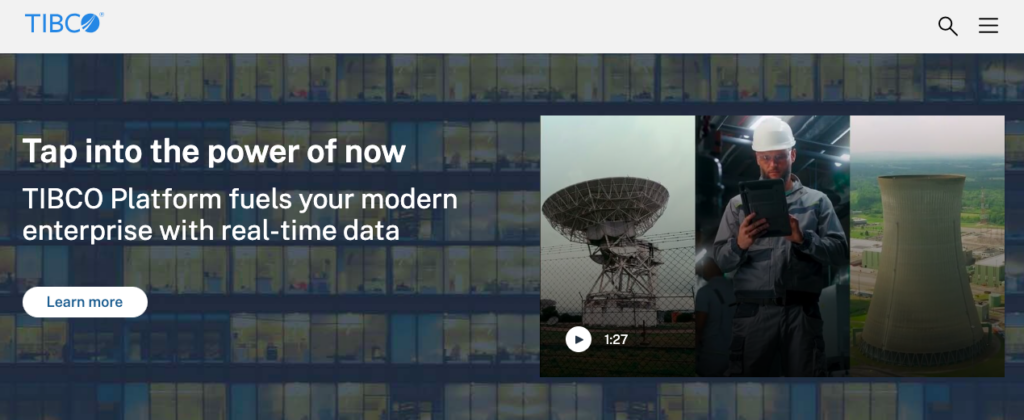
Tibco Key Products
TIBCO Platform is a multi-functional solution that comprises such components:
- Process Management enables automation and digitization of daily business operations.
- Data Grid provides highly scalable database solutions that support real-time operations, such as transactions.
- Event Processing monitors the enterprise environment and detects changes in databases, IoT devices, and applications, helping businesses to take timely actions as a response.
- Messages enable real-time data distribution between disparate endpoints, being a backbone of event-driven and streaming architectures.
- Integration accelerates corporate-level connectivity with no-code experience.
In this article, we mainly focus on the Integration component and its capabilities to bring the enterprise application data into a single space.
Key Features of TIBCO
Now, let’s review the core characteristics of each TIBCO product.
| Product | Features |
|---|---|
| Process Management | – Flexible and independent organizational models – Elastic organizational structures – Built-in business process patterns – Ad-hoc activities supporting regular processes |
| Data Grid | – In-memory data caching – High availability and fault tolerance – Support for multi-datacenter deployment – Platform and language independency |
| Event Processing | – Event monitoring – Data management with clustering, built-in caching, and persistent storage – Cloud deployment – Machine learning capabilities |
| Messages | – Fine-grained service control – Hybrid deployments – Secure communication channels |
| Integration | – Integration of traditional and modern enterprise tools – Development of APIs and microservices for integrations – B2B processes automation – Secured file transfer |
Most Typical TIBCO Use Cases
TIBCO software is currently being used in Banking, Healthcare, Manufacturing, Retail, and other sectors of the economy. Companies implement this tool to accomplish their business goals effectively and rapidly.
We’ve prepared some of the most typical cross-industry use cases for the Integration product.
- Data integration. Extract data from multiple sources, blend it, apply transformations, and map it to the structure of the destination system. This is particularly useful for getting a general overview of the company’s performance and making predictions for the future of the business.
- API management. Create and share APIs with a low-code approach for B2B app integration. This helps enterprises improve data visibility across departments and enhance overall collaboration.
- Event-driven integration. Embed event-driven flows into applications using a visual flow designer. This provides better control and monitoring over your regular business operations.
- Centralized file management. Automate the process of sending and receiving files with scheduling options. This helps companies accelerate data exchange between various entities, partner organizations, and stakeholders.
Why Might You Need to Migrate from TIBCO?
Even though TIBCO grants enterprise-level security on data integration along with other benefits, it mightn’t be an ideal solution for each and every company. Obviously, it also has some drawbacks, which might be notable for certain businesses. Therefore, many organizations opt for TIBCO competitors instead.
The most common reasons for switching from TIBCO Integration to alternative solutions are:
- A limited number of pre-built connectors for cloud-based data sources.
- The endpoint-based pricing model can be hard to understand.
- Learning curve is steep compared to similar tools.
Top TIBCO Alternatives & Competitors
While TIBCO might be relevant for large enterprises with high data loads, it isn’t likely the right fit for small companies. Therefore, it makes sense to start exploring TIBCO alternatives, paying attention to their key features and benefits.
In this article, we’d like to explore several TIBCO competitors:
- Skyvia
- SAS Data Management
- Informatica
- Talend
- Boomi
- IBM InfoSphere
- Mulesoft
In the table below, there is a brief description of each solution, along with its principal characteristics. We’ll also present tips on selecting the one that would suit your company.
| Rating G2 | Pros | Cons | Best for | Pricing | |
|---|---|---|---|---|---|
| Skyvia | 4.8/5.0 | – Ease of use- Suitable for anyone- Connectivity- Detailed error messages | – Only one scheduled integration on a free plan- Email notifications need to be configured | Businesses of any size and any industry | Free plan available. Paid plans start at $79/month. |
| SAS | 4.2/5.0 | – Connectivity- Unified metadata environment- SQL queries | – High costs- Initial training needed- Infrastructure updates required | Banking, Finance, and Retail companies | Custom |
| Informatica | 4.3/5.0 | – Microservice-based- Avanced encryption- Advanced reporting | – No detailed message description- Occasional issues | Insurance, Healthcare, and Education companies | Volume-based pricing model |
| Talend | 4.0/5.0 | – Large number of connectors- Low-code approach- Pipeline reuse | – No concurrent licenses- Occasional bugs | Telecommunications, Government, and Healthcare companies | The cost is discussed with their Sales team based on the four pricing plans |
| Boomi | 4.4/5.0 | – Integration testing- Onboarding courses- 99.9% uptime | – Many connectors come at an extra cost- Error messages are not clear | Manufacturing and Education industry | The cost is discussed with their Sales team based on the five pricing plans |
| IBM InfoSphere | 4.1/5.0 | – Holistic data management- Connection with other IBM products- Native metadata support | – Technical expertise required- High costs- Difficult initial setup | Automotive, Insurance, Telecommunications, and Travel sectors | First, the tool demo is scheduled. Then, a Sales representative comes to discuss the cost. |
| Mulesoft | 4.4/5.0 | – Advanced data transformations- Legacy system support- API usage analytics | – Steep learning curve- API portal limits | Mid-size and large enterprises that use Salesforce in any industry | Feature-based pricing model |
Skyvia: Universal Alternative to Tibco
Skyvia is among the notable Tibco software alternatives on the market, as it’s easy to use and affordable. It offers a universal multi-functional cloud platform suitable for simple and complex data integration scenarios.
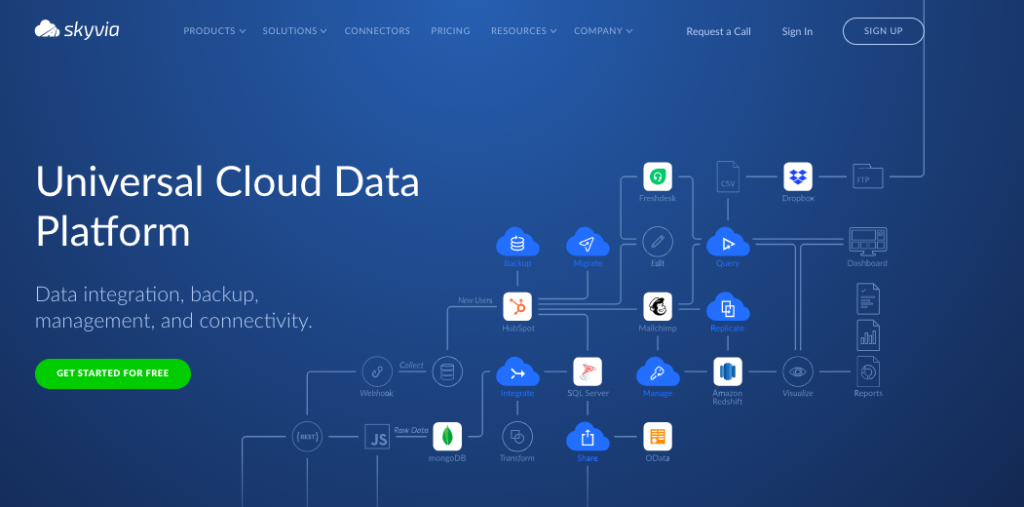
Skyvia contains products for automating daily business operations, creating API endpoints without coding, querying data with SQL, and information integration. The latter function is provided by the Data Integration product, which will be reviewed in detail.
It can easily gather data from multiple cloud applications, databases, data warehouses, and flat files and send it to the desired system. The Data Integration solution supports both ELT and ETL technologies for data transfer and integration.
Reviews
G2 rating: 4.8 out of 5.0
G2 reviews state that users value Skyvia’s ease of use, along with its comprehensive data integration and management capabilities.
Best for
This data integration solution is an excellent choice for businesses of any size operating in any industry. Skyvia has subscription plans that cover various feature sets and data volumes.
Key Benefits of Skyvia
- Ease of use. This service is accessed via a browser, so no extra desktop installations are required. There are also tips and hints throughout the account environment, which makes it easier for Skyvia users to configure and surveil data-related processes to go smoothly.
- Suitable for anyone. Skyvia doesn’t require any programming language knowledge even to set up complex data integration scenarios and pipelines. It introduces a smart visual wizard that helps establish the connection between apps in seconds.
- Data connectivity. This platform offers 200+ pre-built connectors to various data services, including databases, data warehouse, cloud applications, storage systems, and many others.
- Detailed error description. In case any data integration issues occur on integration, detailed log statements are provided.
- Fremium plan available. Skyvia offers a free, fully-featured version so that users can try it out and decide whether this solution is the right one for them. There are also no limits on the data connectors available for use. The only thing is the limited number of scheduled integrations and the amount of data processed.
Skyvia relies on the volume- and feature-based pricing model. Feel free to select the appropriate plan to scale digital data integration operations!
Pricing
Skyvia has four pricing tiers, including the free one. It also offers a custom plan with the cost calculated individually for each particular case, which is particularly suitable for enterprise-grade companies.
| Free | Basic | Standard | Professional | |
|---|---|---|---|---|
| Price starts at | $0 | $79 | $79 | $199 |
| Records per month | Max 10K | Min 5M | Min 500K | Min 5M |
| Scheduling | Once a day | Once a day | Once an hour | Every minute |
| Integration scenarios | Basic | Basic and advanced | ||
| Scheduled integrations | 2 | 5 | 50 | Unlimited |
SAS Data Management
SAS Data Management integrates information from various sources, ranging from legacy systems to modern data lakes. It supports Spark and MapReduce computer tiers, S3 and Parquet file systems, as well as Cassandra and MongoDB databases.
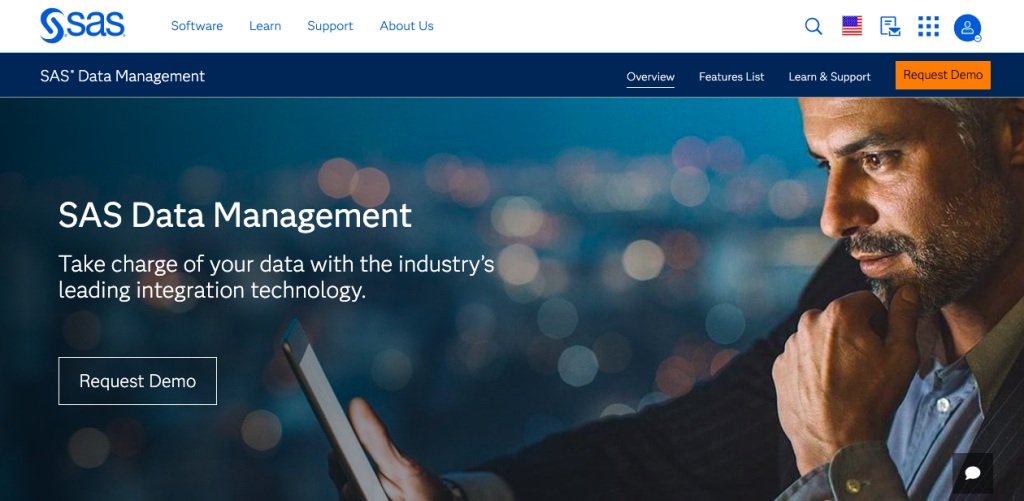
This software supports practically any data type and can apply any transformations to it. The data from multiple platforms gets extracted and blended and then prepared with SAS Data Management. Such an approach makes the data available for analytical tools to support informed business decisions.
Reviews
G2 rating: 4.2 out of 5
G2 user reviews admit that initial training and robust data management features are the major strengths of this tool.
Best for
SAS Data Management functionality enables timely risk detection of fraudulent transactions. Therefore, this solution could be particularly suitable for businesses operating in the Banking, Insurance, Retail, and Life Sciences spheres.
Advantages
The main benefits of SAS Data Management are the following:
- Connectivity between digital platforms, apps, databases, etc.
- A unified metadata environment for a clear understanding of data from any source.
- Support for SQL queries and operations.
See the comparison between the Skyvia vs. SAS Data Management features.
Cons
The most notable limitations of this solution are the following:
- High cost of licencing and maintenance.
- Requires initial training due to the complexity of this platform.
- Requires ongoing support and infrastructure updates to ensure optimal performance.
Pricing
SAS Data Management provides individual fares for each business, from private entrepreneurs to integrational enterprises. It also offers a free trial that allows users to try out how this platform functions within their corporate infrastructure.
Informatica
Informatica offers multiple solutions for enhanced data visibility from different perspectives. We’ll mainly focus on the Intelligent Cloud Data Management tool that constructs ETL and ELT processes involving high data volumes. This tool also allows businesses to scale up or down quickly according to their current needs using the pay-as-you-go pricing model.
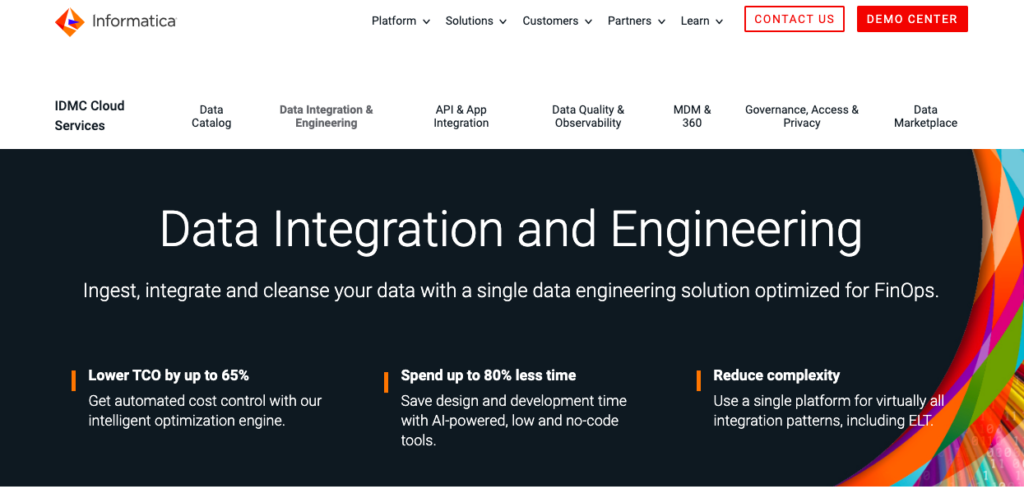
Informatica considerably simplifies the developer’s work as it allows them to automate routine tasks and schedule integrations. All this is also accompanied by transparency for workloads and pipelines.
Reviews
G2 rating: 4.3 out of 5.0
The users of Informatics Cloud Data Integration value its ability to handle scaling workloads and a high number of data connectors.
Best for
Intelligent Cloud Data Management usually applies to Insurance, Healthcare, Education, Life Sciences, and Financial Services companies. Thanks to this platform, digital transformation in the insurance industry becomes easy to manage as it unites all the components of the value chain within the data cloud. When it comes to Life Sciences, Informatica provides an exclusive opportunity to quickly respond to public health emergencies by gathering research results from various sources and providing a complete overview of the situation.
Advantages
Here are some of the most notable benefits of Informatice Cloud Integration:
- Microservices implementation for optimal performance of data pipelines.
- Advanced encryption mechanisms for secure information transfer over network.
- Accurate information on actual compliance regulations.
- Advanced reporting and auditing for enhanced governance.
See Skyvia vs Informatica features comparison.
Cons
This tool is often associated with such limitations:
- Lacking detailed error message descriptions.
- High prices compared to similar data integration solutions.
- Occasional issues.
Pricing
This tool adheres to the volume-based pricing model that is defined in the quote based on your specified needs. Informatice applies an AI engine for resource and cost optimization.
Talend
Talend provides a Data Integration solution that collects information from dispersed sources at high speed. This tool ensures automatic data checks for quality, transformation, and mapping options.
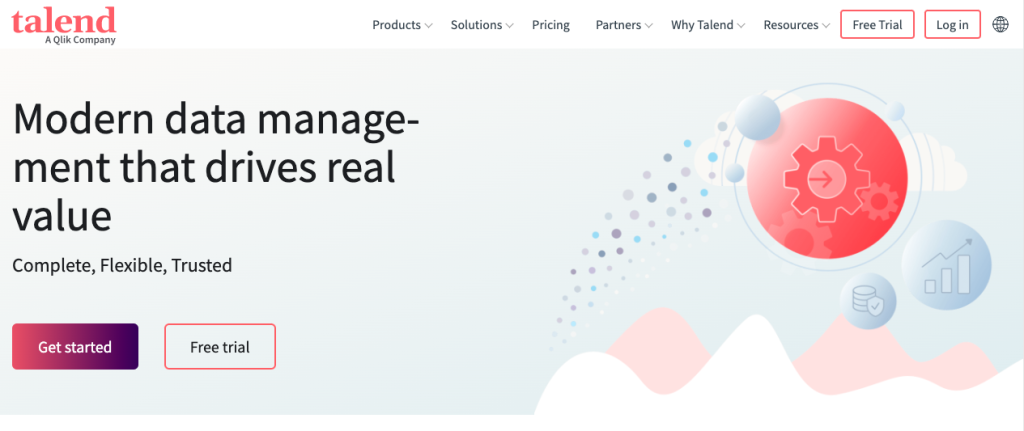
This tool supports ELT/ETL and change data capture (CDC) approaches, making it appropriate for both batch and streaming flows. Despite being a cloud-native solution, it also supports certain on-premises applications and systems.
Reviews
G2 rating: 4.0 out of 5.0
Talend Data Integration users particularly value the ease of setup and use along with the overall quality of data integration and automation.
Best for
Talend Data Integration is particularly efficient for companies in the Telecommunication, Government, Healthcare, and Financial industries. For instance, Healthcare organizations might benefit from Talend gathering and systemizing all the patient data in clinical trials to make precise analyses of the research findings. In the governmental sector, this solution can help gather incoming information from various public apps and ensure its compliance with GDPR regulations.
Advantages
The core advantages of this tool are:
- Mechanisms for building and reusing data pipelines in the cloud environment.
- Low-code approach to working with data.
- Data migration from legacy systems into modern applications.
- Extensive connector library.
See the Skyvia vs Talend features comparison.
Cons
Here are the drawbacks of Talend Data Integration:
- No concurrent licenses, only seat licenses on the cloud.
- Occasional unidentified bugs.
- Low responsiveness of technical support.
Pricing
There are four basic pricing plans, which mainly differ in terms of features, deployment options, and connector types. The cost of Informatice solutions is not available to the public and should be discussed with their Sales teams.
Boomi
Boomi is an iPaaS (Integration-as-a-Service) platform that contains a set of tools for data-related tasks. We’ll particularly focus on one of its components called Integration. It allows businesses to blend data from different applications using pre-built connectors.
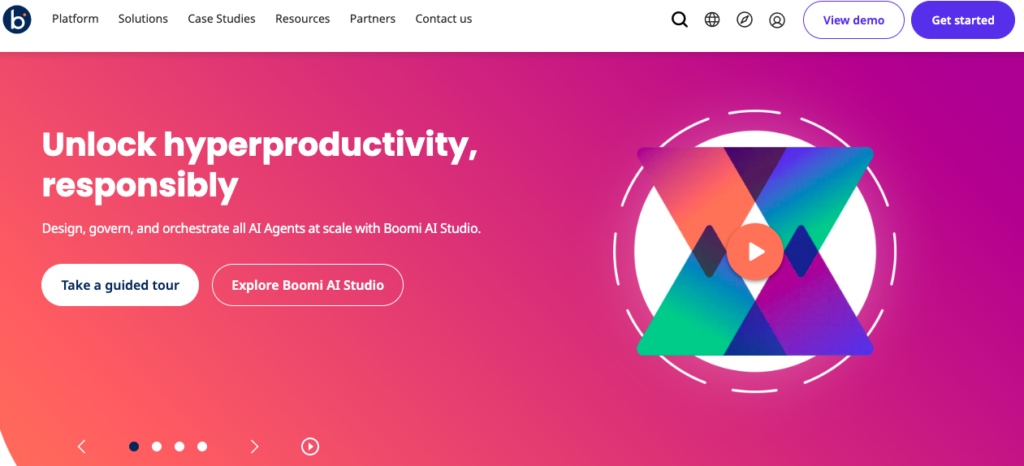
Boomi enables users to spend less time on data maintenance and put more effort into business development. This service also dramatically reduces manual work and minimizes human-generated errors.
Reviews
G2 rating: 4.4 out of 5.0
Boomi users appreciate the tool’s features for data integration, along with a high number of pre-built connectors to popular applications, databases, and other sources.
Best for
Boomi is used across different teams within companies in the Manufacturing and Education industries as well as within public sector institutions. For instance, many renowned universities use this solution to gather information from official academic sources and custom student apps to provide the most actual classroom locations, exam dates, and job opportunities for graduates.
Advantages
Boomi is known for the number of benefits it provides to users:
- Integration testing helps to explore the data flows before implementing them in the production scenario.
- 99.9% uptime for the integration processes, which enables data integration flows to run even without an internet connection.
- Onboarding courses are available for those with no experience in data integration as well as for seasoned technical experts.
See the Skyvia vs Boomi feature comparison.
Cons
Boomi is known to have such limitations:
- Many connectors can be purchased at an extra cost.
- The user interface is slightly outdated.
- Misleading error messages.
Pricing
Boomi has five major subscription plans, which mainly differ in terms of the connectors’ quantity, support, and security features. The prices are not publicly available, so there is a need to contact their Sales Team for such details.
IBM InfoSphere
IBM InfoSphere Information Server is a modern tool for data cleaning, management, transformation, and integration. All these operations can be performed at high speed due to its parallel processing and load-balancing features. This helps to drive out meaningful deductions in a timely manner to contribute to company development and competitiveness in the industry.
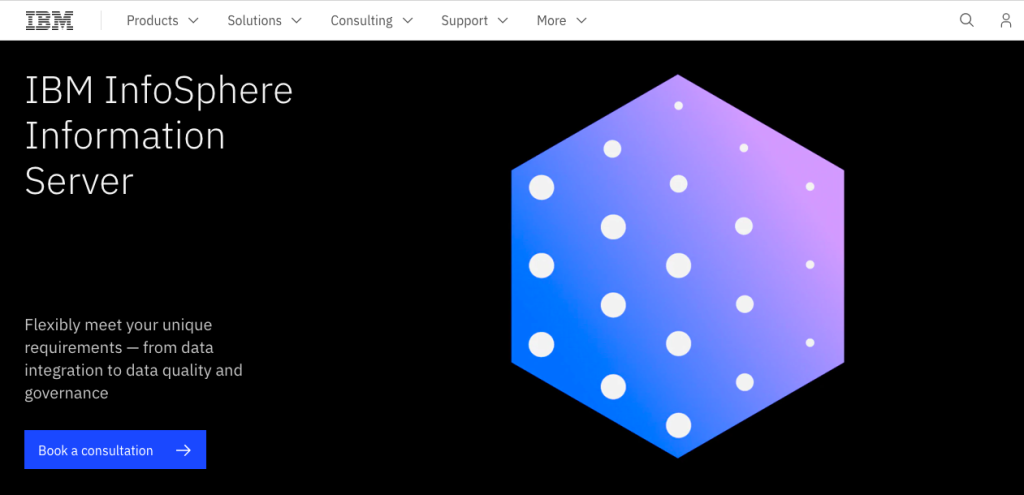
This solution supports various cloud environments and can be deployed in public, private, or hybrid settings. Such an approach makes IBM InfoSphere adapted for scaling workloads.
Reviews
G2 rating: 4.1 out of 5.0
Users value this tool for its outstanding data management and analytics capabilities.
Best for
IBM InfoSphere Information Server is primarily popular in the Automotive, Insurance, Telecommunications, and Travel sectors of the economy. For instance, Automotive companies need to keep track of new product features and their testing results. Since these operations are carried out by various departments, there is a need to align them across an organization. This is where IBM InfoSphere can greatly help.
Advantages
Here are the main advantages of this tool:
- A comprehensive set of solutions for holistic data management.
- Seamless connection with other IBM products.
- Native metadata querying and analysis.
See Skyvia vs IMB InfoSphere features comparison.
Cons
Here are some of the known drawbacks of this tool:
- Technical expertise is required.
- Difficult initial setup.
- High costs.
Pricing
Before getting the pricing information, it’s necessary to book a demo with the data integration consultant. If you have a buying intent after exploring the product, a Sales Manager will get back to you with the quote.
Mulesoft
Mulesoft is an all-in-one software for data integration purposes. It connects SaaS applications, legacy systems, and on-premises databases within a single environment.
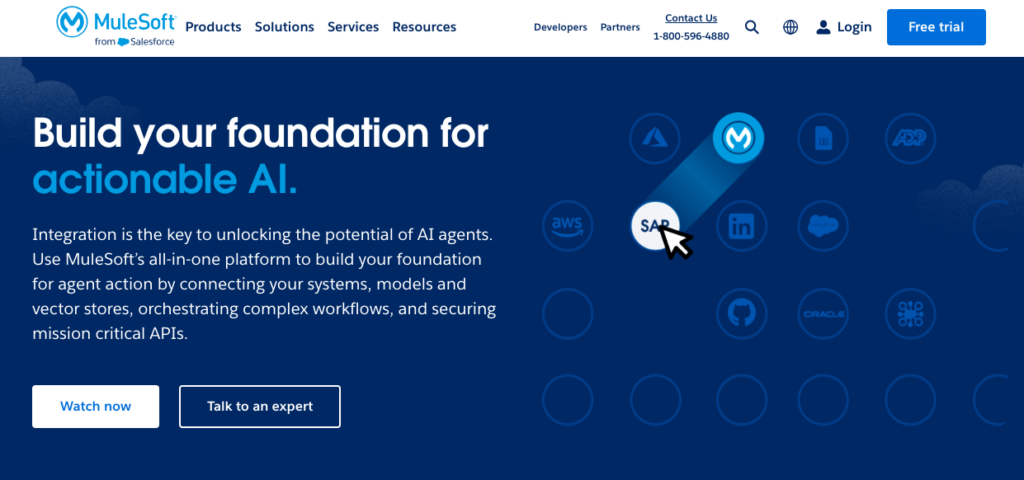
This tool was acquired by Salesforce in 2018, so it has advanced integration features for connecting this CRM to other systems. MuleSoft and Salesforce together unlock data across systems, build scalable integrations, and design automation frameworks to create holistic client profiles and ensure better customer experiences.
Reviews
G2 rating: 4.4 out of 5.0
Most Mulesoft users like its API management and integration features.
Best for
This tool is suited for mid to large enterprises across industries. It helps businesses to connect diverse data sources, especially those heavily reliant on Salesforce.
Advantages
Here are the key benefits of Mulesoft:
- Advanced data mapping and transformation.
- Containerization from cross-platform integration.
- Support of legacy systems.
- API usage analysis.
Cons
Here are some tangible limitations of this solution:
- API portals can have a maximum of 1,000 APIs.
- A steep learning curve.
Pricing
Mulesoft provides feature-based pricing plans, the cost of which is discussed individually with their Sales representatives.
Summary
Choosing the appropriate data integration tool might sometimes be a real challenge. Companies have to check that the software matches their integration needs and doesn’t exceed budget limits.
While TIBCO appears to be an excellent tool for establishing connectivity between cloud and on-premises services, data merging, and transformations, this tool isn’t suitable for every business. There are many alternative services, such as IBM InfoSphere, Skyvia, Talend, and many others, that provide excellent data management features.
We’d suggest exploring Skyvia as a universal platform for data-related tasks. It’s a multifunctional solution with features for data ingestion, blending, and transformation. What makes this tool even more attractive is the variety of pricing plans, allowing companies of any size and activity type to take advantage of data integration.
FAQ for Tibco Software Alternatives
Is Skyvia a suitable alternative to TIBCO for complex enterprise integrations?
Since Skyvia offers tools (Data Flow and Control Flow) for building complex integration scenarios, it might be considered a decent TIBCO alternative. For instance, Data Flow involves several data sources on integration and applies complex multi-stage data transformations.
Does Skyvia support real-time data integration like TIBCO?
Skyvia doesn’t support real-time data streams, but it offers 1-minute intervals for batch processing, which is close to the real-time pace.
Can I migrate my existing TIBCO integrations to Skyvia?
As TIBCO and Skyvia are separate tools developed by different providers, the existing TIBCO integrations can’t be migrated to Skyvia. Instead, you’ll need to create new integration scenarios using pre-built connectors that interest you in Skyvia.
What kind of support does Skyvia offer compared to TIBCO?
Both tools offer similar support options: a knowledge base for self-service and a contact form to report a technical issue and get assistance over email. In addition, Skyvia offers a forum where popular questions are discussed.
